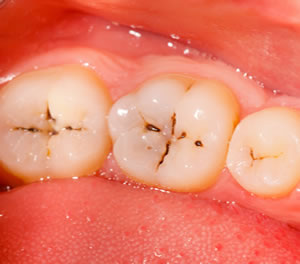INTRODUCTION
In the realm of oral health, one of the most common adversaries people face is dental caries, more commonly known as cavities. The battle against cavities is ongoing, but armed with knowledge and proper oral care, victory is within reach. This article by Krishees Dental will delve into the intricacies of dental caries, from what they are and how they form to strategies for winning the fight against them.
What Are Dental Caries?
Dental caries, or cavities, are small holes or damaged areas in the hard surface of your teeth. They occur as a result of tooth decay, which is primarily caused by the interaction between oral bacteria and the sugars in the food we consume. Understanding the enemy is crucial to mounting an effective defense.


The Formation of Dental Caries
-
Initial Demineralization
The battle begins with the demineralization of tooth enamel. When acids produced by bacteria and sugars combine, they weaken the enamel, making it more susceptible to decay.
-
Plaque Formation
Oral bacteria join forces to create plaque, a sticky film that clings to your teeth. This plaque harbors harmful bacteria that continue to release acid, accelerating the demineralization process.
-
The Erosion of Enamel
As the acid assault continues, enamel erosion progresses, leading to the formation of tiny holes – the early stages of cavities.
Factors That Fuel the Battle
-
Dietary Habits
Unhealthy dietary habits, particularly excessive sugar consumption, provide ample ammunition to the enemy. Cutting back on sugary snacks and beverages can be a powerful countermeasure.
-
Inadequate Oral Hygiene
Inadequate brushing and flossing create a favorable environment for plaque buildup. Maintaining a consistent oral hygiene routine is essential in the battle against cavities.
Winning Strategies
-
Brushing Techniques
Brushing techniques are essential for proper oral hygiene. Use a soft-bristle toothbrush and fluoride toothpaste. Brush for two minutes, covering all tooth surfaces. Angle the brush at 45 degrees towards the gumline, using gentle circular and back-and-forth motions. Don’t forget to brush your tongue and rinse thoroughly.
-
Flossing Regularly
Flossing regularly is crucial for dental health. Use dental floss or interdental brushes to clean between teeth and remove plaque and food particles. Gently slide the floss up and down, curving it around each tooth. Aim for daily flossing to maintain healthy gums and prevent cavities.
-
Fluoride Treatment
Fluoride treatment is a dental procedure that strengthens tooth enamel and prevents tooth decay. It involves applying fluoride varnish, gel, or foam to teeth, helping to remineralize weakened areas. Dentists often recommend fluoride treatments, especially for children, to promote oral health.
-
Sealants
Dental sealants are thin, protective coatings applied to the chewing surfaces of molars and premolars. They act as a barrier, preventing food and bacteria from causing cavities in these vulnerable areas, especially in children and adolescents. Sealants are a preventive measure to maintain oral health.
-
Balanced Diet
A balanced diet is crucial for overall health, including dental well-being. It should include a variety of fruits, vegetables, lean proteins, whole grains, and dairy products. Avoid excessive sugary and acidic foods to prevent tooth decay, while promoting strong teeth and gums.
The Importance of Regular Dental Check-ups
At Krishees Dental, we offer a range of orthodontic treatments, including traditional metal braces and clear aligners like Invisalign. Our orthodontists will assess your specific needs and help you choose the best treatment option to achieve optimal results.
-
Professional Assessment
A professional assessment is an integral part of dental care. Dentists conduct thorough evaluations of oral health, including examinations, X-rays, and assessments of teeth, gums, and overall oral structures. This helps identify issues early, enabling effective treatment and maintenance of oral well-being.
-
Professional Cleaning
Professional cleaning, or dental prophylaxis, is a crucial part of oral hygiene. Dentists or dental hygienists remove plaque, tartar, and stains from teeth, reducing the risk of cavities and gum disease. It’s typically recommended every six months to maintain optimal oral health.
Conclusion
The battle against cavities is a lifelong struggle, but with knowledge and the right tactics, you can emerge victorious. By understanding the formation of dental caries and adopting good oral hygiene practices, you can fortify your defenses and maintain a winning smile.
FAQs (Frequently Asked Questions)
- Are cavities only a concern for children?
No, cavities can affect individuals of all ages. Proper oral care is essential for everyone.
- How often should I visit the dentist to prevent cavities?
Regular dental check-ups every six months are recommended to catch and prevent cavities early.
- Can natural remedies like oil pulling prevent cavities?
While some people claim benefits from oil pulling, it’s not a substitute for traditional oral hygiene practices like brushing and flossing.
- Is it possible to reverse cavities naturally?
In the early stages, enamel damage can sometimes be reversed with fluoride treatments, but advanced cavities usually require dental restorations.
- Are sugar-free candies and beverages safe for teeth?
While sugar-free options are better than sugary ones, they can still be acidic and harm teeth. Moderation is key in protecting your dental health.

Leave a Reply